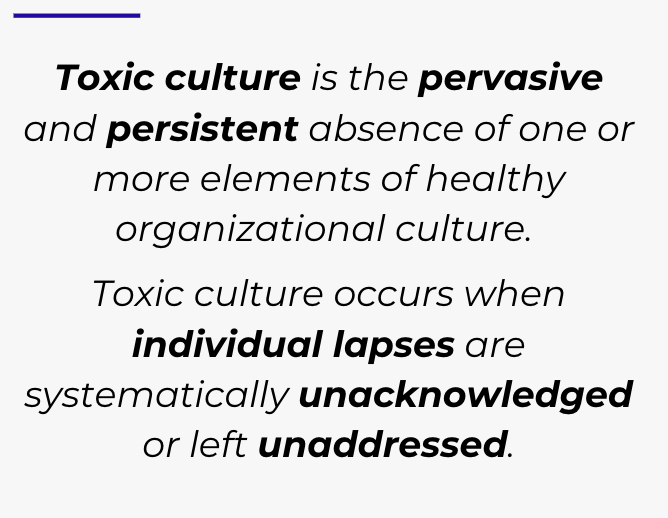Sometimes I am really caught off guard by comments on LinkedIn. I know—not exactly an earth-shattering revelation.
For the last 4 months or so, I have been engaging daily on LinkedIn. As a “solopreneur” it has been my substitute for colleagues. I have a group of folks I engage with regularly, most of whom also work in the areas of culture and leadership. One result of this effort has been feeling like I’m in a bit of an echo-chamber. There aren’t a lot of contrarian views in my daily feed.
Occasionally I run across a thread that completely surprises me. Here’s a great example. If you don’t want to read the whole thing here’s a brief summary:
The original poster (OP) shares a picture that says “Get rid of toxic employees that perform.”
- His post makes it clear that what he means is that even when a toxic employee is a high performer, it needs to be addressed.
Sample comments include:
- I disagree. That so called “toxic” employee might be behaving that way according to someone else’s bias because they want to keep them in a box because it’s a safety net for a superior to not have to work hard in reality
- There really is no such thing as a toxic employee that performs well, that’s what people are paid for after all, if part of that so called performance is to babysit, entertain and tolerate others less capable than, be it, but make it part of the JD and don’t hold them
- Too bad that many employees who stand up for themselves are deemed “TOXIC”.
We talked about this post during the workshop series in February and attempted to get under the hood with respect to why people were SO defensive about the idea that a toxic high-performer is a bad thing.
First, I think OP could have been a little clearer. In some cases, people misinterpreted his language. But if we take that off of the table…there seems to be one factor underlying this “debate.”
We have to understand what constitutes healthy culture before we can define toxic culture.
None of these counter-narratives are places I want to work. Labeling people toxic because they stand up for themselves? Places where we are expected to tolerate low expectations? A workplace that allows a superior a “safety net” to not have to work hard?
No, thank you.
Making excuses for poor performance is NOT the goal here. Healthy organizations have high expectations, accountability, clarity of purpose, goals, and communication, strong and supportive leadership, and many other factors.
I haven’t found a definition of toxic work culture that I like, so I’m working on my own.
You can see that my working definition depends on an understanding of healthy culture.

Would love to hear your thoughts on this definition – what’s missing? Share in the comments below!
0 Comments